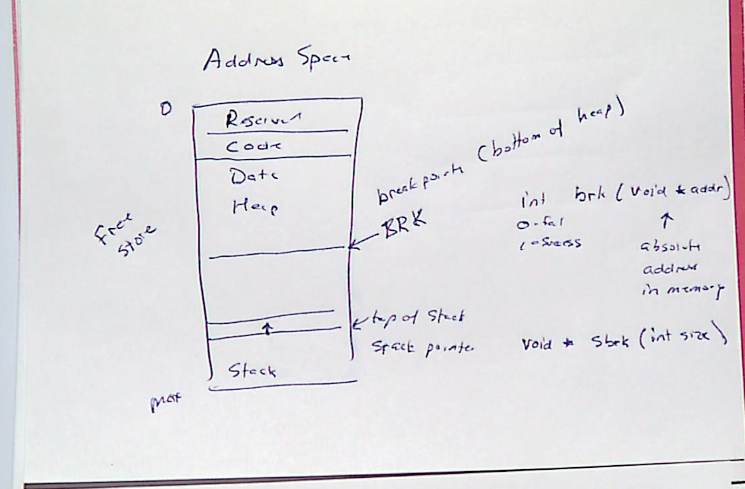LEC 2
Build procss:
sum.c -> C preprocessor: cpp
-> compiler proper (cc1) translate to assemely: sum.s, s - source
-> assembler (AS): translate to machine code: sum.o, relocatable object file
-> linter (LD): excutable : a.out, sum.exe
# -g: start debugger# -o: output filename# -Wall: turn on warnings# -E: will stop after the preprocessor runs# -S: assembley source filegcc -E -g -o sum.i demo.c -Wall # stop at the preprocessorgcc -S -g -o sum.s demo.c -Wall # stop at the compiler propergcc -c -g -o sum.o demo,c -Wall # stop at the assembler, machine code
scp file.name yingwei@linux-best.cs.wisc.edu: cs354/
scp source dest
LEC 3
//From uppercase to lowercase
char_uppercase = char_lowercase - ('a' - 'b');
//arrays of characters
char str[] = "CS354"
LEC 4
variable names:
- uppercase
- lowercase
- underscores(library variables)
-
primitive data type
integer - 4 byte
- modifiers
- char - 1 byte
- short int - 2 byte >= char
- int - 4 byte >=short
- long int - 8 byte >= int
- long long int - 8 byte >= long
- float - 4 byte
- double - 8 byte
-
sign + and -
-
C comment
// line coment
- / / block comment
- //*
Strings
C 参数
int main(int argc, char *argv[]){
return 0;
}
$ ./mysort 2 8 9 1 4 5
argc = 7
argv[ 0 ] = ./mysort
argv[ 1 ] = 2
argv[ 2 ] = 8
argv[ 3 ] = 9
argv[ 4 ] = 1
argv[ 5 ] = 4
argv[ 6 ] = 5
C 语言没有切片操作:q[-1]是越界行为out of boundary,但是[-1]实际上上地址-1*sizeof(datatype)
Array
array不能计算
int a[] = {1,2,3}; a++; -> false, cannot increment an array.pointer and array
x == &x[0] *x == x[0]Also, for any array or pointer p and index i the expressions p[i] and (p + i) are equivalent. ```c int p; p[0] == (p + 04); p[1] == (p + 14);
// same meaning int* myPointer = new int[100];
int firstValue = *(myPointer + 0); int secondValue = myPointer[1];
<a name="Qdg4A"></a>
##
---
<a name="ilrNe"></a>
# struct
```c
struct student{
char *name;
int id;
}
struct person{
char name[100];
int id;
}
int main(){
struct student s;
s.id = 12;
s.name = "mike";
struct person p;
p.id = 22;
//p.name = "alice" // doesn't work. p.name is a variable in stack and unmutable
// trying to assign a pointer to a string into a string.
strncpy(p.id, "alice", 100);
}
Pointer 指针
- asterisk, segmentation fault is runtime error
- 表示定义一个指针变量,以和普通变量区分开,例如int a = 100; int *p = &a;。
表示获取指针指向的数据,是一种间接操作,例如int a, b, p = &a; p = 100; b = *p;。
int *p = NULL; *p = 1; // this will cause segmentation fault because cannot dereference a null pointerpointer and 2d array
- A[0][2] = *(A[0] + 2)

- assign pointer to integer directly ```c double *p = 0;
double *p; p = 0; // by doing this, we assign the address p with 0, we never dereference the p
- **functions to increment pointer and value **
```c
void increament_value(int *ptr){*ptr += 1;}
void increament_pointer(int **ptr){*ptr += 1;}
int main(){
int arr[2] = {0, 1};
int *ptr = arr;
increament_pointer(&ptr); // this will change ptr to arr2[1]
increament_value(ptr); // this will change value of arr2[1] as 2
}
Sizeof
- pointer 的sizeof 都是 8,不管是什么类型
sizeof and len
len("hello") -> 5 sizeof("hello") -> 6, which will include the last /0 character.whenever pass the Array to a function, sizeof(Array) will always return the pointer size - 8
i ++ and ++i
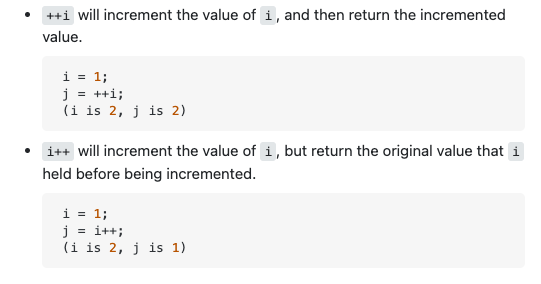
strcpy and memcpy
(dest, source)
两者都是复制ptr2 to ptr1, 而不改变ptr内存放的地址。memcpyx需要提供长度(唯一区别)
Memory Alloc
Address Space
Implicit and explicit
- Implicit - programming language use internal garbage collection, java/python
- Explicit - malloc / free, programmer responsible
Super Simple Memory Allocator
block - header(metadata), payload(user space), padding(wasted space)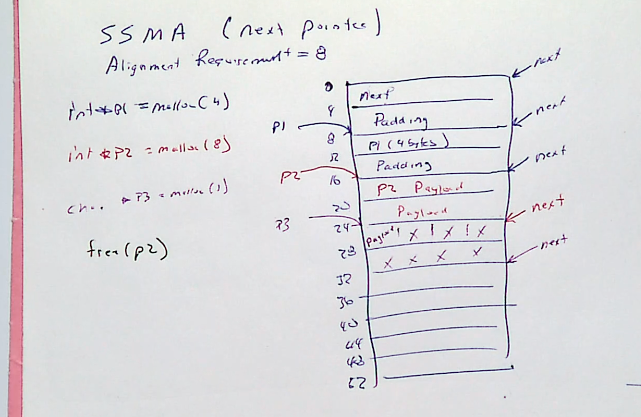
address 0 - 4, store next pointer at the head of the heap
HOWEVER, if I wanna free p2, there is no way to get the size of p2, and this it the problem.
GOALS:
- Maxmize throughput
- Maxmize memory utlization, minimize padding, holes and metadata
Fragmentation
- Internal - wasted space inside of a block
- alignment
- minimize block size
- chose no to split
- External - have enough total free space to meet the request, but it’s broken into several pieces(object is bigger than hole)
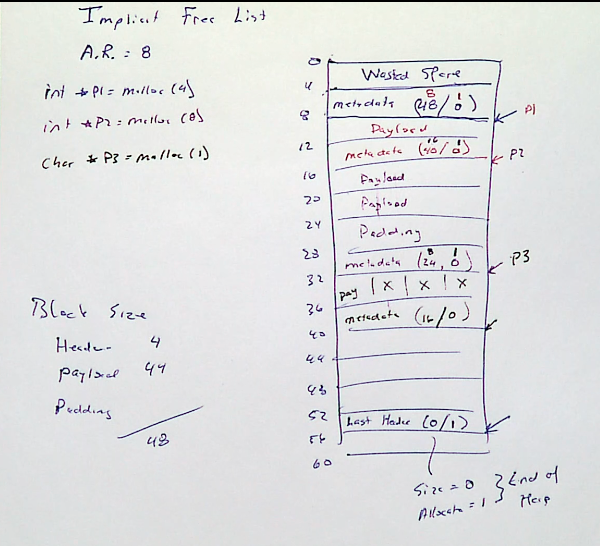
structure: the address should divisible by 8
— metadata (next address / if-allocate)
— payload
— padding
free - coalescing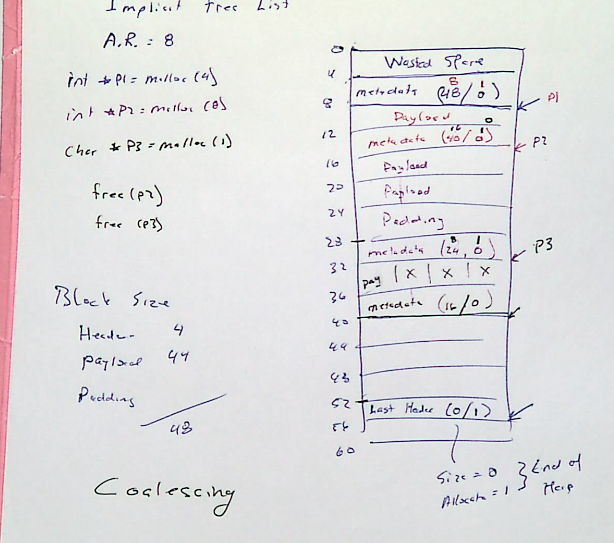
Math trick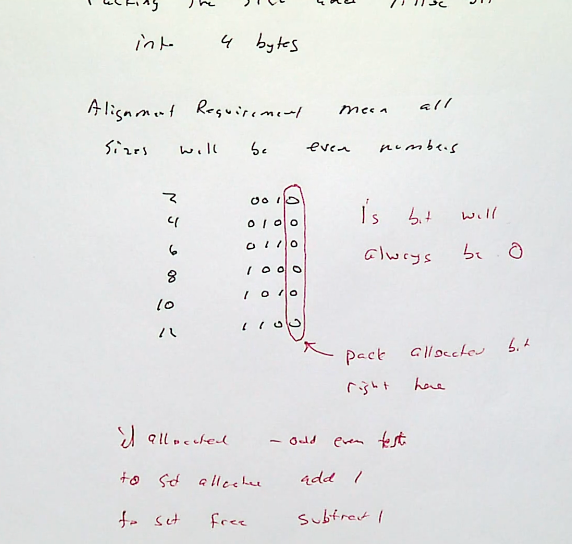
- Fitness Policy
- splitness
- freeing
- coalessing
- boundary tags (footer) -> like double-linked list
- advanced boundary tags
Coalscing
- immediate - block after (1 step)
- deferred - block before (traverse)
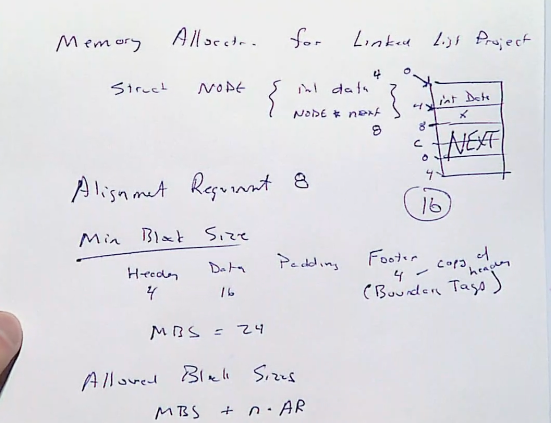
coalscing after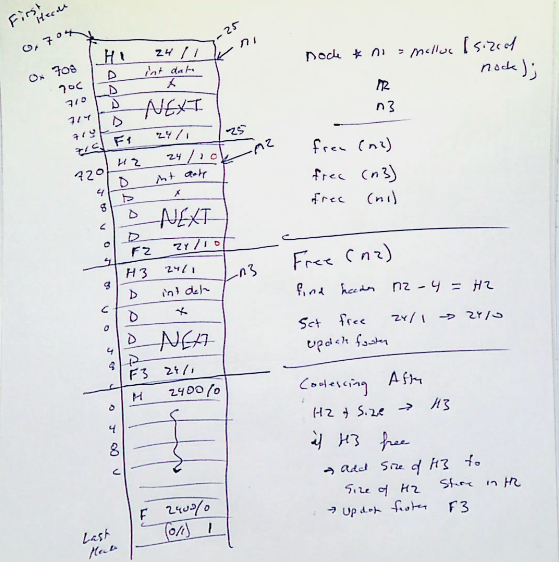
before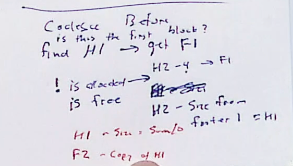
H1 = size = sum_size / 0
F2 = copy of H1
Assembly
movl 0x1000, %eax
movl 1000, %eax // atuomatically converts to hex address and reads memory
location 0x3E8
// register to hold the memory addressing
movl $0x1000, %eax
movl (%eax), %ebx // parentness here means dereference
movl 8(%eax), %ebx
0x1000 + 0x8 = 0x1008 stores 42 in %ebx
